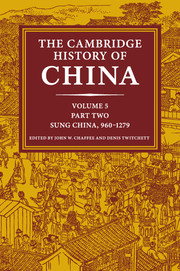
- Cited by 4
-
Cited byCrossref Citations
This Book has been cited by the following publications. This list is generated based on data provided by Crossref.
2015. Books Received. The China Quarterly, Vol. 222, Issue. , p. 588.
Tackett, Nicolas 2017. A Companion to Chinese History. p. 118.
Hartman, Charles 2020. The Making of Song Dynasty History.
Ebner von Eschenbach, Silvia Freiin 2022. Droughts, Floods, and Global Climatic Anomalies in the Indian Ocean World. p. 31.
- Publisher:
- Cambridge University Press
- Online publication date:
- March 2015
- Print publication year:
- 2015
- Online ISBN:
- 9781139193061
- Series:
- The Cambridge History of China
- Collection:
- Cambridge Histories - Asian History




